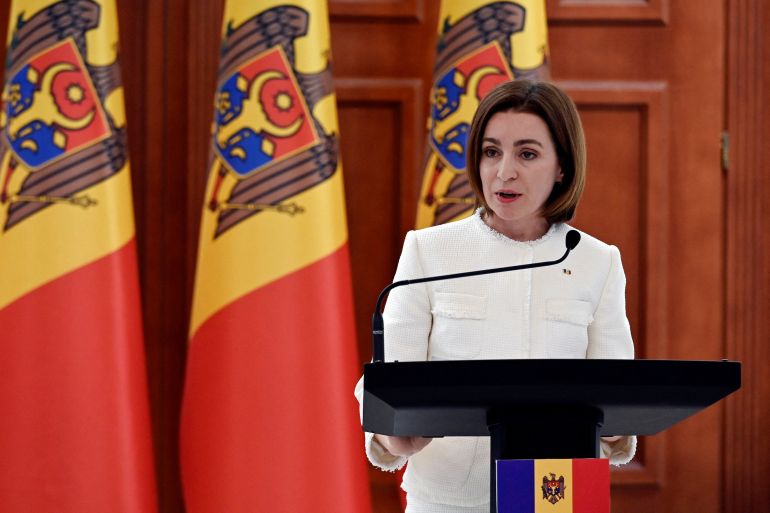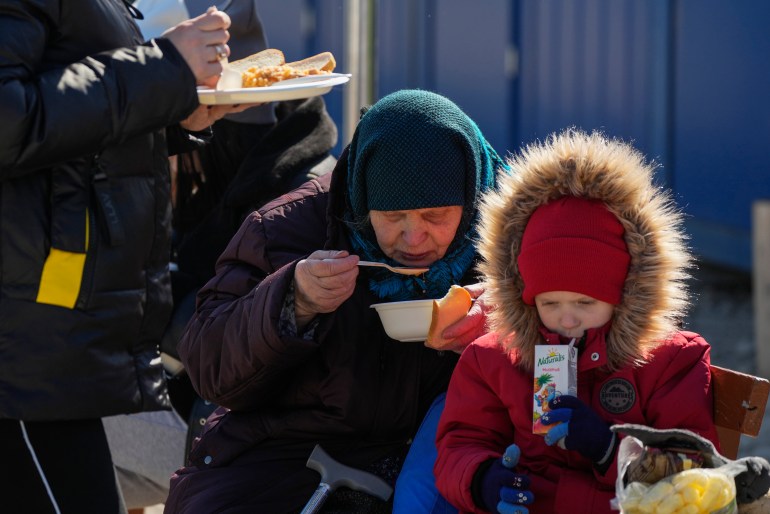Moldova pursues neutrality, EU membership amid Ukraine war
Ukraine’s neighbour maintains a military non-alignment over its fear of Russia, but submits a bid to join the EU.

Chisinau, Moldova – After Russia’s invasion of Ukraine last month, neighbouring Moldova, a nation of about 2.6 million, submitted a bid to join the European Union along with Georgia and Ukraine.
Moldova’s government has condemned Russia’s war in Ukraine and sought the European Union’s support in handling the influx of refugees coming across its borders, while signalling its continued desire to be part of the European bloc.
Keep reading
list of 4 itemsMoldova officially applies for EU membership
Moldova will get 3bcm gas per year in new deal with Russia
Russia ‘weaponising’ gas supply in Moldova dispute, EU says
“This is a very important symbolic step for the country to reaffirm its European identity,” Janis Mazeiks, the head of the EU delegation to Moldova, told Al Jazeera.
Still, the symbolism of this bid butts up against the political dynamics that have long existed in Moldova, where pro-Russian opposition parties continue to advocate for strong ties with Moscow.
While Moldova’s current government is pro-EU, neutrality is enshrined in its constitution, and most in the government are against the country’s direct entanglement in military alliances, like the North Atlantic Treaty Organization (NATO).

Unlike Ukraine, which is both pro-EU and pro-NATO, Moldova holds separate positions on these alliances.
Politicians from both sides in Moldova maintain that neutrality is important, which is a crucial distinction from a security perspective, said Denis Cenusa, a Moldovan analyst with the Eastern Europe Studies Centre.
“That was signalling to Russia that Moldova does not want to be the next target,” he said.
‘Turning point’
Before the war in Ukraine started, Cenusa said the emphasis was on peacekeeping, but after Russia’s invasion, the current government started talking about Moldova’s neutral status more than ever.
“That was probably a turning point in messaging, indirectly, about non-alignment with NATO,” he said.
In addition to sending a signal to Russia, Cenusa said this reaffirmation of neutrality is also intended as a message to the West about the particularity of Moldova’s security situation.
Ukraine’s insistence on joining NATO was one of Russia’s stated reasons for invading the country, and Russia’s contentious relationship with NATO dates to the end of the Cold War when former Soviet countries joined the military alliance.
Russia sees NATO’s expansion towards its border as a threat to security and Ukraine remaining outside of the alliance remains a precondition for Russia’s working out a settlement of the conflict.
Moldova does have an action plan with NATO focused on reforming its defence and security and has received support from the EU’s border forces to help with the influx of refugees.
Transnistria challenge
But maintaining a political stance on neutrality is also an important matter domestically for relations with Transnistria, a pro-Russian breakaway region along the border with southwest Ukraine.
The region is internationally recognised as part of Moldova, but Russian troops are based there.
Transnistria presents a security challenge for Moldova’s pro-EU government and Russia has been accused of influencing Moldova’s political process through its presence in the region.
Moldova’s President Maia Sandu, along with NATO and the United States, has called for the removal of Russian troops from Transnistria.
“We continue to plead for a peaceful settlement of this conflict, and we will do everything we can to find and implement a diplomatic, peaceful political solution,” Sandu said in a joint press conference with Romania’s President Klaus Iohannis last week.
Recent polls show that most Moldovan citizens support European integration but oppose a military alliance with NATO. But some people still have security concerns about Russia’s ambitions in the region.
Vlada Ciobanu, 33, a volunteer helping with refugee relief efforts said in the first few days of the war in Ukraine, people were panicking about a possible Russian invasion of Moldova.
“There were people queueing at cash machines and people on the streets talking about how they’re doing their luggage,” she said.
Ciobanu also said things have calmed down since then, and many people have thrown themselves into helping refugees.
So far, there have been few signals from Russia that Moldova is next in line for its attack, but a lingering feeling of uncertainty remains for locals and refugees.
Ciobanu said she had relatives who considered coming to the country from Ukraine, but decided to continue to other parts of Europe, because they fear a Russian invasion.
“Moldova’s fate is not really certain,” she said.
Not mutually exclusive
While Moldova distances itself from NATO politically, it leans further into its relationship with the EU for humanitarian support to help with the reception of Ukrainian refugees.
Mazeiks said Moldova’s neutrality is not a factor in the EU’s relations with the country.
“Being pro-EU and being pro-neutrality are not mutually exclusive,” he said.
Instead, the focus would be on continuing projects with Moldova to make it meet the EU’s membership criteria.
“It’s not about words,” Mazeiks said, referring to the areas of concern for membership bids, ranging from rule of law to human rights and the fight against corruption.
“These are all very detailed questions that will eventually need answers,” he said.